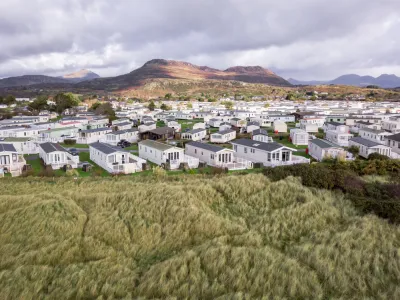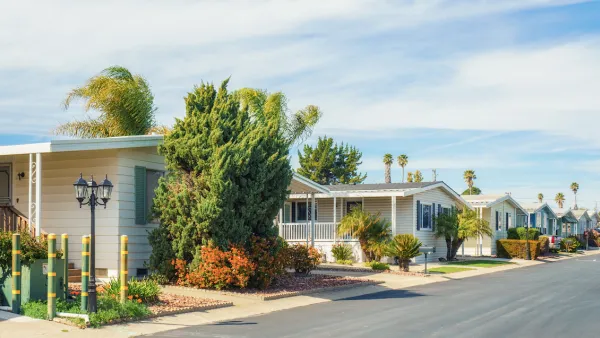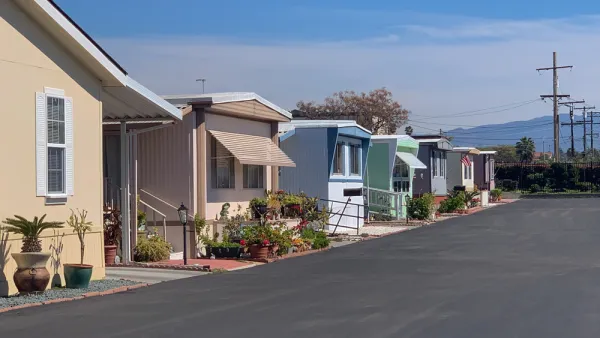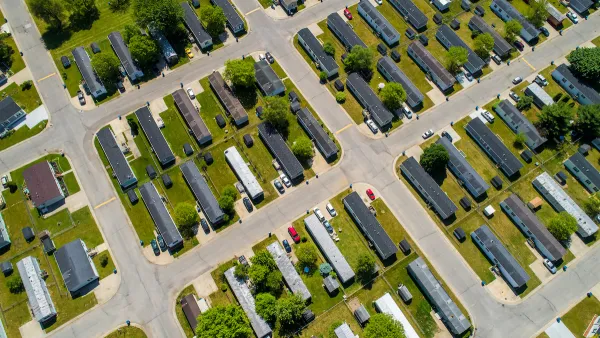Making it easier for mobile home park residents to collectively purchase the land they live on can protect their housing affordability for the long term.

“Because they don’t own the land beneath their homes, mobile home residents are at the mercy of the park’s owners, who could raise their rents or even shut down the park altogether as the land is redeveloped,” writes Kevin Hardy in Stateline. As more investors buy up mobile home parks, the resident ownership model is a key tool in the fight to keep this housing type affordable.
Coming together to buy one of these parks can be a daunting task for residents — but that could be changing. “Earlier this year, the federal government made available $225 million in grants for improvements at mobile home communities, including those owned by residents, and announced plans to allow resident-owned parks to access federally insured financing to keep rents low or make improvements.” These steps could pave the way for more cooperatively owned parks and protect residents from steep land rent hikes.
According to Hardy, “Currently, 22 states have laws requiring or encouraging owners of manufactured home parks to give homeowners the opportunity to purchase their land collectively. Those laws can vary wildly, with some requiring that the residents be given the right of first refusal, while others simply require park owners to provide notice of their intent to sell.” Some industry groups are pushing back, arguing that resident ownership is not always in the best interest of the residents.
Manufactured housing can cost as much as 45 percent less to build per square foot than site-built homes, making them an affordable option for lower-income households, but are often regulated out of neighborhoods largely due to unwarranted stigma. Now more states, including Maine and New Jersey, are enacting or strengthening laws aimed at encouraging collective ownership of mobile home parks and allowing manufactured housing in all residential neighborhoods.
FULL STORY: To save affordable housing, states promote resident-owned mobile home parks

Analysis: Cybertruck Fatality Rate Far Exceeds That of Ford Pinto
The Tesla Cybertruck was recalled seven times last year.

National Parks Layoffs Will Cause Communities to Lose Billions
Thousands of essential park workers were laid off this week, just before the busy spring break season.

Retro-silient?: America’s First “Eco-burb,” The Woodlands Turns 50
A master-planned community north of Houston offers lessons on green infrastructure and resilient design, but falls short of its founder’s lofty affordability and walkability goals.

Test News Post 1
This is a summary

Analysis: Cybertruck Fatality Rate Far Exceeds That of Ford Pinto
The Tesla Cybertruck was recalled seven times last year.

Test News Headline 46
Test for the image on the front page.
Urban Design for Planners 1: Software Tools
This six-course series explores essential urban design concepts using open source software and equips planners with the tools they need to participate fully in the urban design process.
Planning for Universal Design
Learn the tools for implementing Universal Design in planning regulations.
EMC Planning Group, Inc.
Planetizen
Planetizen
Mpact (formerly Rail~Volution)
Great Falls Development Authority, Inc.
HUDs Office of Policy Development and Research
NYU Wagner Graduate School of Public Service




























